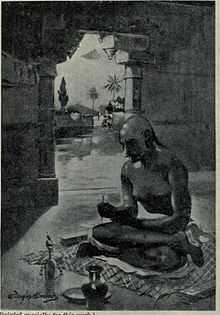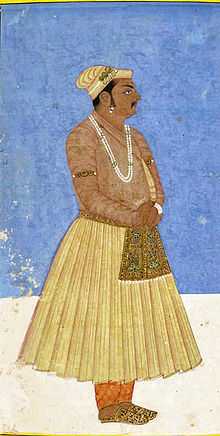Navaratnas
Navaratnas Nauratan (Sanskrit dvigu nava-ratna- or "nine gems") was a term applied to a group of nine extraordinary people in an emperor's court in India. Some well-known groups are in the Raaj Sabha (court) of King Janaka, Emperor Vikramaditya (Chandragupta II) and in Emperor Akbar's "Darbar".
In the court of Vikramaditya (Chandragupta II )
Nine gems during the reign of Vikramāditya (Chandragupta II) of the Gupta Empire.

- Kalidasa, the most notable among them
- Vetala Bhatta
- Varahamihira
- Vararuchi
- Amarasimha
- Dhanvantari
- Kahapanak
- Shanku
- Harisena
In the court of Akbar

The Mughal ruler Akbar, despite his illiteracy, was a great lover of the artists and intellectuals. His passion for knowledge and interest in learning from great minds led him to attract men of genius to his court, known as the nine courtiers of Emperor Akbar or Navratnas:[1]
- Birbal
- Faizi
- Todar Mal
- Raja Man Singh
- Abdul Rahim Khan-I-Khana
- Fakir Aziao-Din
- Tansen
- Mulla Do Pyaja
- Abu'l-Fazl ibn Mubarak
Similar Groups
Many famous emperors in India had courtiers labeled in similar ways. For example, the valuable members of the court of Krishna Deva Raya were termed Astadiggajas, the eight giants. Lakshman Sen the ruler of the Sena Empire had Pancharatnas (meaning 5 gems) in his court; one of whom is believed to be Jayadeva, the famous Sanskrit poet and author of Gita Govinda. Ashtapradhan was the title given to the council of Shivaji.
Modern usage
A number of institutions in modern India are popularly named for this historic group, particularly public-sector units that perform well. As of June 25, 2007,[2] the list included the following PSUs:
- Coal India Limited (CIL)
- Bharat Heavy Electricals Limited (BHEL)
- National Thermal Power Corporation (NTPC)
- Oil and Natural Gas Corporation Limited (ONGC)
- Gas Authority of India Limited (GAIL)
- Indian Oil Corporation (IOC)
- PowerGrid Corporation of India
- Bharat Petroleum Corporation Limited (BPCL)
- Hindustan Petroleum Corporation Limited (HPCL)
- Mahanagar Telephone Nigam Limited (MTNL)
- Bharat Electronics Limited (BEL)
- Hindustan Aeronautics Limited (HAL)
- Power Finance Corporation (PFC)
- Steel Authority of India Limited (SAIL)
References
- ↑ Singh, Vipul (2006). The Pearson Indian History Manual for the UPSC Civil Services Preliminary Examination. Pearson Education India. ISBN 8131717534. p. 140.
- ↑ Official List of Navratnas and miniratnas